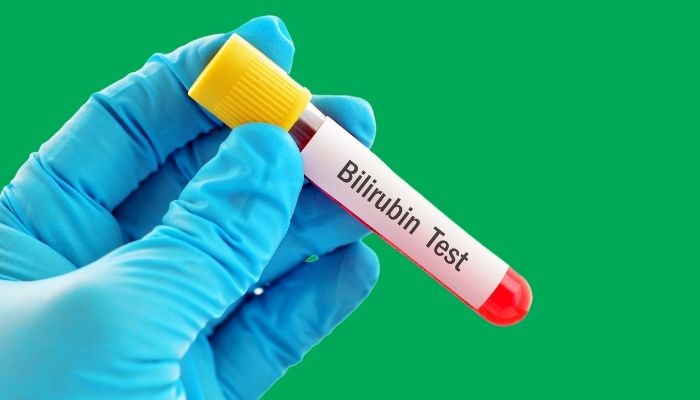What Does Bilirubin In Urine Mean?
Bilirubin is a yellow coloured pigment that is produced during the natural breakdown of the red blood cells. Bilirubin is commonly present in bile (a fluid in your liver that is responsible for digestion). If your liver works fine and is healthy, it will extirpate most of the bilirubin from your body. But if the liver is damaged or injured, bilirubin can be released into the blood and urine. Bilirubin in urine may indicate that you are have liver disease. Bilirubin in urine test checks the bilirubin level in your urine.High levels of bilirubin indicate that you have jaundice (a healthcare condition that makes your skin and eye color yellow).
The cost of the bilirubin urine test is Rs.120 to Rs.150. But the cost may vary depending on your location.
Please check the price of the bilirubin urine test in your nearby areas and other details of bilirubin urine test before booking the test.

Urinary Bilirubin - Test Summary
| Also known as | Urine test, Urine Analysis, UA, Chemical Urinalysis, Direct Bilirubin |
| Test Type | Urine |
| Bilirubin urine test includes | To check the levels of bilirubin in urine |
| Preparation | You don’t need any special preparation for this test |
| Reporting | Within 24 hrs |
| Test price | The cost of the bilirubin urine test is Rs.120 to Rs.150, depending on your location and place. |
| Also included in | Health Insurance Plans |
| Related tests | Liver Panel Test, CBC |
Urine Bilirubin Test : Purpose
Bilirubin in urine test is an important part of urinalysis. A urinalysis test measures various cells, chemicals, and other substances in your urine. This test is suggested by your doctor to check for various liver problems.Bilirubin in Urine Test : Why Did My Doctor Recommend This Test?
Your doctor will refer to this test as part of your regular checkup. You may get suggested this test if you have symptoms of liver disease. These symptoms could be:- Jaundice (a medical condition that turns your skin and eyes yellow)
- Dark-colored urine
- Abdominal pain
- Nausea and vomiting
- Fatigue
- Family history of liver disease
- Excessive consumption of alcohol
- Exposure or possible exposure to hepatitis virus
- Obesity
- Diabetes
- Taking medicines that may damage your liver
Why Does Your Doctor Recommend This Bilirubin in Urine Tests?
Your doctor will refer to this test as part of your regular checkup. You may suggest this test if you have symptoms of liver disease. These symptoms could be:- Jaundice (a medical condition that turns your skin and eyes yellow)
- Dark-colored urine
- Abdominal pain
- Nausea and vomiting
- Fatigue
- Family history of liver disease
- Excessive consumption of alcohol
- Exposure or possible exposure to hepatitis virus
- Obesity
- Diabetes
- Taking medicines that may damage your liver
Urine Bilirubin Test : Preparation
This test doesn’t demand any special preparation from your end. If your doctor refers to other urine or blood test, then you may need to do fasting for several hours before the test. Also, inform the doctor about the medications that you are consuming.Bilirubin in Urine Test : Procedure
After reaching the lab or the diagnosing center, you will get a container to collect the urine.You will be provided with special instructions to ensure that the sample is sterile. These instructions are known as the "clean catch method." The “clean catch method” follows the below-mentioned steps.
- Wash your hands.
- By using a cleansing pad (provided by the diagnostic center or lab), you need to clean your genital area. Before the test, men must clean their penis tip. Women too must clean their genital area by opening their labia and cleaning from front to back.
- Now, you need to urinate on the toilet
- Place the sample container in your urine stream
- Collect at least one to two ounces of urine
- Complete your urination on the toilet
- Return the sample to the lab technician or your healthcare provider
Bilirubin in Urine Testing for Infants
Jaundice is common in newborn babies. Infants are not very much efficient in removing bilirubin from the body. Enhanced bilirubin can lead to jaundice which can be dangerous for infants if the underlying condition isn’t solved.Testing bilirubin through the urine of infants could be an arduous job for parents. Most labs or diagnostic centers will give you the required urine collection bags to fit into your child’s diaper. Place the bag over your baby’s penis or labia and then, wrap them with the diaper.
Use a fresh bag whenever you change the diaper of your baby. Accumulate the contents of each collection bag into the collection container.
Also Read : Best Foods To Eat & Avoid In Jaundice
How to Interpret Bilirubin in Urine Test Results
Bilirubin in urine causes are normally either a liver problem like hepatitis or cirrhosis or a blockage in the bile duct.In normal cases, bilirubin in urine is not present in urine. So when it is found in urine, it can be a sign of liver or bile duct problems.
The bilirubin in urine normal range is generally 0 mg/dL. Even a small amount of bilirubin in urine is abnormal and may need further testing.
Bilirubin in urine tests only measure the function of your liver. If your results are ‘’urine bilirubin abnormal”, your doctor may ask you get other blood or urine tests done for the conclusion.
Consult a Gastroenterologist today!
References:
- Bilirubin - urine. UCSF Health, University of California [Internet].
- Are Unexpected Positive Dipstick Urine Bilirubin Results Clinically Significant? A Retrospective Review. Oxford Academic [Internet].
- Direct Bilirubin. University of Rochester Medical Center [Internet].
- Bilirubinuria. National Library of Medicine [Internet].
